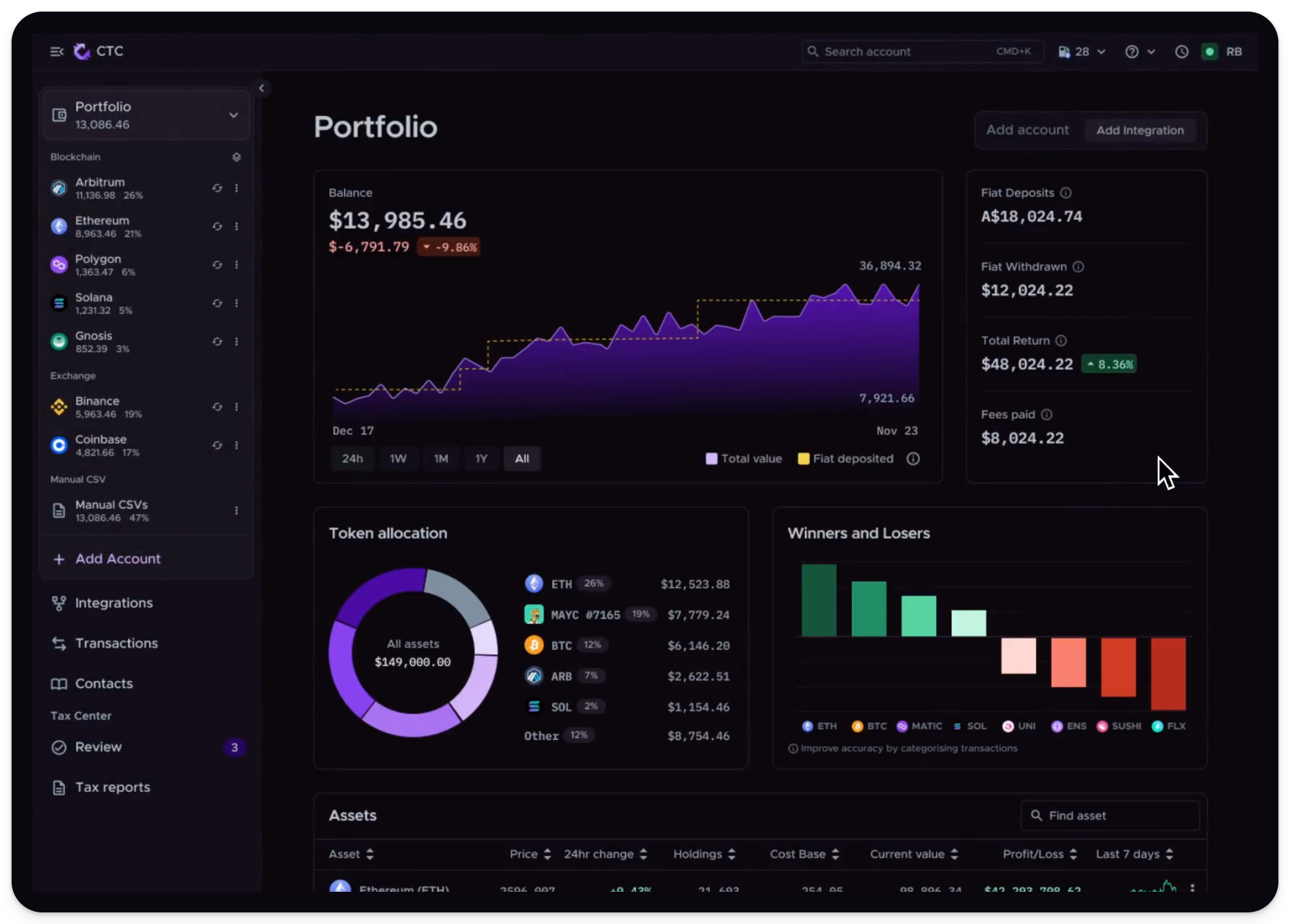.png-a616dc52961c1edd72b0c1fdf5f47e7a.png-d44bdfd9b52d9f76131f38376a1fe385.png) Kraken - See What Crypto Can Be with Kraken
Kraken - See What Crypto Can Be with Kraken
By now, I think everyone knows that the tax man is aware of your cryptographically secured coins and wants a slice of your gains.
Given it is tax season in many countries around the world, we know this time of year can be particularly stressful for crypto natives. The U.S. individual filing deadline is fast approaching, so we’ll focus on the IRS rules in this piece. However, given that many tax authorities treat crypto in a similar way, this will still be relevant for everyone.
Towards the end of 2023, the new meta was pretty obvious: airdrop farming. Let’s look at some of the pitfalls of airdrop taxes, how to file your crypto taxes, and some tips to avoid getting rekt by the tax man. 👇
Editor's Note: With the April 15 deadline coming up, we reached out to Patrick McGimpsey at Crypto Tax Calculator to write up a primer on paying Airdrop taxes. This is not sponsored content!
The Crypto Tax Basics
You need to be aware of two main types of taxes when investing in crypto: capital gains tax (CGT) and income tax. To keep it simple, CGT events occur when you dispose of crypto assets, and income tax events occur when you earn profits in a way that resembles income.
Here is a basic list of some events that fall into each category:
💸 Capital Gains Tax
- Profit made from selling crypto
- Profits made from exchanging crypto (e.g., selling BTC for ETH)
- Purchasing goods or services with cryptocurrency
- Profits made from trading NFTs
💪 Income Tax
- Airdrops
- Staking rewards
- Hard forks
- DeFi/Farming rewards
- Mining
- Salary paid in crypto
Given the number of airdrops over the past 12 months, we’ll focus on handling taxes specifically for airdrop farming and airdrops themselves.

Tax Implications of Airdrop Farming
If you’ve been in the trenches farming airdrops across different protocols and chains, it’s important to understand what your activity may mean for tax purposes.
While the IRS has not released specific guidance on many of the nuanced crypto transactions that exist, there is enough available information to infer how they might treat specific scenarios for tax purposes.
On your travels, you’ve likely deposited crypto in at least one smart contract, whether to stake, farm, provide liquidity, or something else. Whatever you may be doing, it is important to know that the IRS may treat this as a disposal event, triggering a capital gains tax event.
While there isn’t specific guidance on smart contract deposits, the question comes down to beneficial ownership. If you are no longer in control of the tokens after the deposit, the IRS may argue that this was a disposal event.
Let’s consider the following scenario:
Suzan, an avid airdrop farmer, decides to stake 10 ETH in a staking protocol. She initially bought the ETH for $20,000, and at the time she deposited, it had a market value of $25,000.
Suzan considers whether she has maintained beneficial ownership of her ETH during the deposit and believes that she hasn’t. She, therefore, treats the deposit as a disposal, triggering a capital gain of $5,000.
In any case that doesn’t have specific guidance, you typically have two options: adopt the conservative path and avoid penalties, or adopt a more aggressive stance and risk the potential for refiling and paying penalties down the track.
If you adopt a more aggressive stance, you will need to have reasoning to support your claims. It is highly recommended that you speak to a tax professional before going down this path.
It’s important to remember that many smart contracts will also give you a receipt or LP token in return for your deposit. The IRS has clear guidance that crypto-to-crypto trades trigger a CGT event, so if you’ve encountered this situation, you may have a tough time adopting a different approach.
If you’re one of the many people with hundreds or even thousands of smart contract interactions from airdrop farming, you may be thinking about the accounting nightmare you have on your hands. Don’t stress. We’ve outlined some options below that will help you sort out your taxes so you can rest easy at night.

How are Airdrops taxed?
With the actual farming activity out of the way, let’s explore the airdrop itself. The key point about airdrops is that the IRS considers them taxable income at their market value at the time they are received.
Continuing the above scenario:
The protocol that Suzan used to stake her ETH has decided to reward users, and she became eligible to claim 1000 tokens. Suzan went to the airdrop portal and claimed the tokens at the time she received them in her wallet, the tokens had a market value of $15,000.
In this situation, the IRS considers Suzan to have made $15,000 in income.
Suzan decides to hang onto the tokens, and they slowly decline in value. Eventually, Suzan decides to cut her losses and sells the tokens for $5,000 in the same financial year.
In this case, Suzan has triggered a CGT event and banked a loss of $10,000. This is calculated by subtracting the proceeds of the sale from the value at the time Suzan first received the tokens in her wallet.
Suzan didn’t engage in any more crypto activity for the remainder of the financial year. With her $5,000 gain from the staking deposit and the $10,000 loss from selling the airdrop tokens, she ended the year with a net $5,000 capital loss.
The Hidden Pitfalls of Airdrop Farming
Despite making a capital loss of $5,000 and only walking away with $5,000, Suzan must still pay tax on $12,000 of income. How can this be?
The IRS only allows Suzan to deduct $3,000 worth of capital losses from her income per financial year. This has left Suzan in a position where she must pay tax on $12,000 of income despite only having banked $5,000 from the airdropped tokens.
This is the hidden pitfall of airdrop farming (and many other income-generating crypto activities). If Suzan had received a larger airdrop or if the token had fallen even further, this could have spiraled even further out of control.
In some situations, investors have been caught out with owing more tax than the value of their entire portfolio. When it comes to airdrops or any other crypto income, be sure always to set aside enough funds to cover tax immediately so you don’t get caught in this situation.

Avoiding a Crypto Tax Nightmare
Crypto taxes can be a maze at the best of times, but if you have been actively airdrop farming, you could be in for a nightmare if you’re not well equipped.
For crypto natives, having multiple exchange accounts and potentially hundreds of wallets across tons of new chains is common. For tax purposes, you need to have records of all transactions, or the numbers won’t add up, and you may end up overpaying tax.
You have a few options. One is manually calculating taxes yourself, which is probably best if you're just tracking a few basic buys and sells across one or two exchanges. On the other end of the spectrum is consulting a tax professional, which might be your best option if you have a complex weave of holdings and need to talk through where to even begin.
If you’ve fallen into the rabbit hole of DeFi and NFTs and have been involved in airdrop farming, using software like Crypto Tax Calculator is likely your best bet (I work here! Get 30% off your first year with code BANK30). The right crypto tax software will allow you to sync a wide range of wallets and exchange accounts and automatically generate your pre-filled tax forms.
Calculating taxes in crypto can be daunting, but don't procrastinate or set yourself up for pain down the road. Be proactive. You've got this!

 Guest Author
Guest Author 

.png-a616dc52961c1edd72b0c1fdf5f47e7a.png-8359976fdb0656215e306b0de9208da8.png)